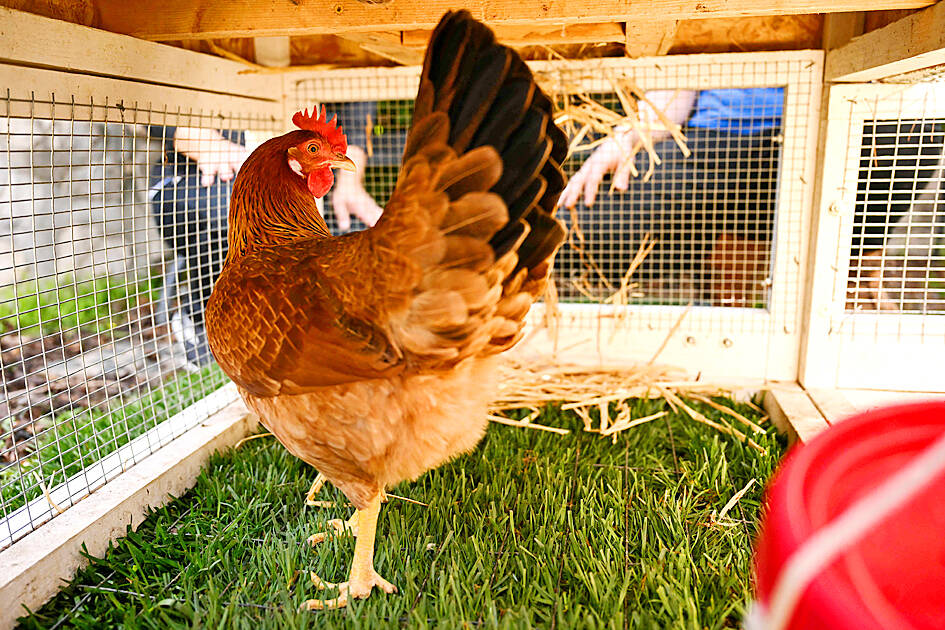Stung by the rocketing price of eggs — and US supermarkets rationing a basic breakfast staple — Kim Yong-mi decided to get some chickens to secure her own supply in southern California.
While many people idly muse about backyard farming, for those not ready to take the plunge permanently, there is a solution: renting a henhouse, complete with egg-laying birds.
“I really want to try it out and see whether I like it or not,” the Los Angeles-area resident told reporters as she took delivery of two chickens and all the equipment they need to live a happy egg-laying life.

Photo: AFP
“Some people I know have chickens at home, but it’s a lot of work for them — they had to adjust the whole garden themselves,” Kim said. “So I think renting a chicken is a good start.”
Hiring hens began to gain ground in the US about a decade ago in Pennsylvania when a farming couple set up Rent The Chicken. Since then, the project has expanded to more than 40 cities across North America, with local farmers setting up their own offshoots.
The service saw an uptick in interest during the COVID-19 lockdowns, when people were stuck at home, but it has skyrocketed in the past few months as consumers quail over the soaring cost of eggs, thanks to bird flu, which has seen the wholesale culling of egg-laying birds.

Photo: AFP
“Especially this year, we have had a much higher interest, I would say, three to four times as much as we were seeing this time last year,” said Victoria Lee, who serves the Los Angeles region from her farm in Agua Dulce.
Some Americans have been forking over more than US$10 for a dozen eggs, up to three times their usual price, with supermarkets putting daily limits on the number of cartons a shopper can buy.
In March eggs were 60 percent more expensive than a year earlier, the US Department of Agriculture said.
However, Lee is quick to point out that raising chickens at home is not cheaper than buying eggs at the store. Instead, it is a question of quality.
“By the time they get to the grocery store [eggs] are on average 48-60 days old,” she said. “As eggs sit, no matter the quality at the start of that countdown, over time, the protein in the eggs begins to break down.”
Backyard eggs, in contrast, are only as old as however long it took the owner to pick them up off the henhouse floor.
“Rent the Chicken” offers different options that range from about US$500 to more than US$1,000 for six months, depending on location and number of birds desired.
Packages include the birds, food, waterers and feeders, additional treats and a chicken care guide.
However, it is the included coop that is most striking — a sort of mini house with what looks like a patio, completely protected by fences.
It is also moveable, thanks to wheels on the bottom.
“Every day, our renters will lift this up ... and move it forward ... with the chickens having access to fresh grass each day,” Lee said. “They’re getting the experience of being on wide-open pasture with that new stimulation, new bugs to look for, new grass to dig through, while still being safe in a predator-proof coop.”
The convenience is what made the package attractive to Kim, a university professor living in La Crescenta, near Los Angeles, and when her new coop arrived, she was absolutely thrilled.
“Free eggs,” Lee exclaimed while unloading the new backyard tenants and handing over a complimentary dozen laid the previous week.
A client with two chickens can expect up to 14 eggs per week, Lee said.
Kim, whose son is an athlete who eats a lot of eggs, said that although the supply crisis prompted her to rent the chickens, it’s “bigger than that.”
“I really wanted to have something for the kids, also to learn as a way of life, and to compare the taste of the eggs,” she said.

In Italy’s storied gold-making hubs, jewelers are reworking their designs to trim gold content as they race to blunt the effect of record prices and appeal to shoppers watching their budgets. Gold prices hit a record high on Thursday, surging near US$5,600 an ounce, more than double a year ago as geopolitical concerns and jitters over trade pushed investors toward the safe-haven asset. The rally is putting undue pressure on small artisans as they face mounting demands from customers, including international brands, to produce cheaper items, from signature pieces to wedding rings, according to interviews with four independent jewelers in Italy’s main

Japanese Prime Minister Sanae Takaichi has talked up the benefits of a weaker yen in a campaign speech, adopting a tone at odds with her finance ministry, which has refused to rule out any options to counter excessive foreign exchange volatility. Takaichi later softened her stance, saying she did not have a preference for the yen’s direction. “People say the weak yen is bad right now, but for export industries, it’s a major opportunity,” Takaichi said on Saturday at a rally for Liberal Democratic Party candidate Daishiro Yamagiwa in Kanagawa Prefecture ahead of a snap election on Sunday. “Whether it’s selling food or

CONCERNS: Tech companies investing in AI businesses that purchase their products have raised questions among investors that they are artificially propping up demand Nvidia Corp chief executive officer Jensen Huang (黃仁勳) on Saturday said that the company would be participating in OpenAI’s latest funding round, describing it as potentially “the largest investment we’ve ever made.” “We will invest a great deal of money,” Huang told reporters while visiting Taipei. “I believe in OpenAI. The work that they do is incredible. They’re one of the most consequential companies of our time.” Huang did not say exactly how much Nvidia might contribute, but described the investment as “huge.” “Let Sam announce how much he’s going to raise — it’s for him to decide,” Huang said, referring to OpenAI

The global server market is expected to grow 12.8 percent annually this year, with artificial intelligence (AI) servers projected to account for 16.5 percent, driven by continued investment in AI infrastructure by major cloud service providers (CSPs), market researcher TrendForce Corp (集邦科技) said yesterday. Global AI server shipments this year are expected to increase 28 percent year-on-year to more than 2.7 million units, driven by sustained demand from CSPs and government sovereign cloud projects, TrendForce analyst Frank Kung (龔明德) told the Taipei Times. Demand for GPU-based AI servers, including Nvidia Corp’s GB and Vera Rubin rack systems, is expected to remain high,